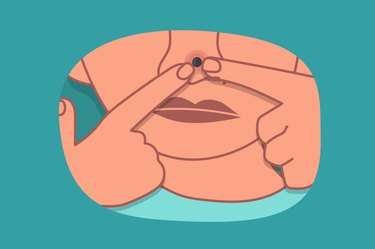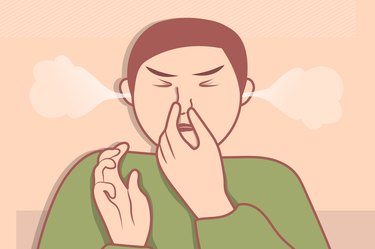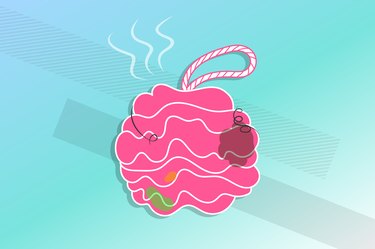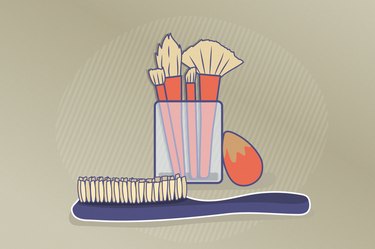
No one likes it when a bunch of blackheads make your nose resemble a connect-the-dots diagram. When dark bumps plug up your pores and form an unsightly constellation on your complexion, your first instinct is probably to burst those blackheads into oblivion.
But, as satisfying as it may seem to get rid of all that gunk, popping blackheads isn't always the best thing for your skin.
Video of the Day
Video of the Day
We spoke with Joshua Zeichner, MD, director of cosmetic and clinical research in dermatology at Mount Sinai Hospital, to find out what kind of damage you can do by breaking open a blackhead and how to safely squeeze these dark spots.
What Is a Blackhead?
A type of acne, blackheads are open skin bumps that become blocked by excess oil and dead skin. Essentially, blackheads are large blockages in your pores, Dr. Zeichner says.
Blackheads blossom on your face (sometimes on your neck, back and chest) when a hair follicle or sebaceous (oil) gland becomes inflamed, according to the Cleveland Clinic.
1. It Can Cause an Infection
"If you disrupt the outer skin layer with your fingernails or a sharp instrument, it can cause an open sore and increase the risk of getting an infection," Dr. Zeichner says.
The odds of infection increase exponentially if your skin, your fingers or the tool you're using isn't properly sanitized, he adds.
2. It Might Make Blackheads Bigger
Squeezing may bring bacteria (or more oil) into the opening of your blackhead, according to the Cleveland Clinic. And this can balloon your blackhead's size or even spread it to other sites on your skin.
3. It Can Result in Redness and Painful Swelling
"Applying too much pressure to the skin can cause inflammation, redness [and swelling]," Dr. Zeichner says. It can even rupture the pimple deep in the skin, he adds.
And when this happens — i.e., when you push a blackhead further down into your skin — it'll likely lead to a painful irritation.
4. It May Cause Scarring
If you botched your blackhead while squeezing, you might even leave a lifelong mark on your skin.
That's because when the skin undergoes significant trauma, inflammation or an infection, it needs to repair itself, Dr. Zeichner says. "And in some cases, the skin may actually heal with a permanent scar," he says.
Related Reading
What to Do Instead of Squeezing
"The best way to treat a [blackhead-type] pimple is to prevent it from happening," Dr. Zeichner says. Topical treatments are the best way to banish the blackheads you have and stop new ones from developing, he says.
1. Stick to Salicylic Acid
"Salicylic acid is a beta hydroxy acid that helps remove excess oil and dead cells from the surface of the skin," Dr. Zeichner says. That means it can help clear your pores, keep your hair follicles from becoming clogged and dry out blackheads.
Salicylic acid is available in the form of cleansers or lotions. Topicals with salicylic acid include CeraVe Acne Control Gel ($16.70, Amazon.com) and Clean & Clear Advantage Acne Spot Treatment ($6.47, Walmart.com).
2. Reach for Retinoids
"Topical retinoids like over-the-counter adapalene act like pipe cleaners: they prevent cells from sticking together and blocking the pores," Dr. Zeichner says. "Plus, they enhance cell turnover to help bring out the blockages."
Products with retinoids include Differin Gel ($14.62, Amazon.com) and Neutrogena Rapid Wrinkle Repair Retinol Face Serum ($14.50, Amazon.com).
But keep in mind: "Retinoids take several weeks of continuous use to exert their effects, so be patient," Dr. Zeichner says.
Also, retinoids tend to be irritating (they can cause redness or peeling, especially when you first start using them). So, to decrease these side effects, try applying them every other day or layering a light moisturizer on your skin before you use them, per the Cleveland Clinic.
Related Reading
But if You Insist on Squeezing Blackheads at Home…
While squeezing a blackhead can damage your skin (especially if you do it the wrong way), the right technique can be safe for your skin. That's because blackheads are a 'poppable' type of pimple, Dr. Zeichner says.
Here's what that means: "Think of your pore like a pipe connecting your oil gland to the surface of the skin," he says. "Blackheads are wide pipes with relatively easy access to the blockages." In other words, blackheads are close to the surface, so removing them tends to be less troublesome.
On the other hand, "tender, 'underground' pimples [think: deep below the skin] do not have a clear connection to the surface of the skin, so trying to squeeze them inevitably causes more harm than good," Dr. Zeichner says.
So, if you choose to bust open a blackhead at home, follow these steps, courtesy of Dr. Zeichner, to decrease any damage to your skin.
How to Remove a Blackhead
- Thoroughly wash your hands and skin before you begin. This will reduce the risk of dirt or pathogens passing into your skin and causing an infection. And if you're using a comedone extractor ($4.99, Amazon.com) — a handheld device with a hollow circle at the tip that's designed to extract blackheads and whiteheads — make sure to disinfect it too.
- Using two Q-tips, apply gentle "down and in" pressure on either side of the blackhead. Squeezing with your nails is a no-no. This can accidentally break the skin and provide a potential pathway for bacteria to enter.
- Don't apply too much pressure. If the blackhead doesn't burst easily, abort the mission and try again another day.
So, How Bad Is It Really to Squeeze Blackheads?
"The truth is that it's actually OK to pop your pimple, so long as it's the right type of pimple [like a blackhead], and you're doing it the right way," Dr. Zeichner says.
So, there you have it: permission to pop your blackheads. Again, though, safety first: The wrong squeezing strategy can cause infections or even scarring.
Was this article helpful?
150 Characters Max
0/150
Thank you for sharing!
Thank you for your feedback!
Is this an emergency? If you are experiencing serious medical symptoms, please see the National Library of Medicine’s list of signs you need emergency medical attention or call 911.



